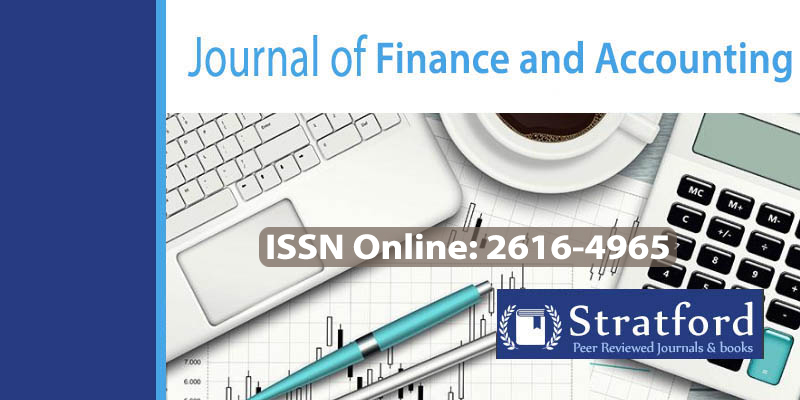Monetary Policy Implementation and Financial Performance of Commercial Bank in Rwanda: A Case of Equity Bank, Rwanda
DOI:
https://doi.org/10.53819/81018102t2256Abstract
This study analyzed the effect of monetary policy implementation on the financial performance of commercial banks in Rwanda. Descriptive research design was adopted to examine how monetary policy variables affect financial performance measured by return on assets and return on Equity in Equity Bank for a period of 5 years (2017- 2021). The Study is established on loanable fund theory, New Keynes model, and classical theory of interest rate and Efficiency theory. Regression coefficient, Analysis of variance, Regression analysis, descriptive statistics (Mean and Standard deviation) and inferential (Correlation and inferential analysis) were used to estimate the joint and effect of monetary policy variables measured by interest rate, reserve requirement and liquidity management on financial performance of commercial bank . The study revealed that the endogenous variables (interest rate, reserve requirement and liquidity management) were significantly related with the dependent variable (financial performance). Thus, these independent variables strongly have an effect on the financial performance of commercial banks in Rwanda. It is concluded that monetary policy implementation has been effective for commercial banks in Rwanda by increasing their financial performance. Therefore, the Study recommended that commercial Banks should consistently adopt monetary policy implementation that will help Rwandan banks to improve on their profitability.
Keywords: Monetary Policy Implementation, Financial Performance, Commercial Bank, Equity Bank, Rwanda
References
Adenuga, A. O. (2020). Time Series Analysis of Interest Rate on Investment in Nigeria. Nile Journal of Business and Economics, 6(14), 52-79.
Bech, M. L., & Malkhozov, A. (2016). How have central banks implemented negative policy rates. BIS Quarterly Review March.
Bhattarai, K., (2011). “Impact of Exchange Rate and Money Supply on Growth, Inflation and Interest Rates in the UK”. International Journal Monetary Economics and Finance. [online] 4(4).
Blaxter, L., Hughes, C., & Tight, M. (2010). How to research. McGraw-Hill Education (UK).
Ibekwe, A. O. (2021). Exchange Rate and Performance of Deposit Money Banks in Nigeria.
Jegede, C. A. (2014). Effects of monetary policy on the commercial banks lending in Nigeria. Review of Public Administration and Management, 3(5), 134-146
Jibril, A. K., & Nwanmou, C. N. (2012). Research Method in Social Sciences and Education. Umuahia: Cijeh Concept Publisher.
Kothari, C. R. (2004). Research methodology: Methods and techniques. New Age International.
LindiweC. K., Emmanuel M.&Akwesi A. K., (2017). “Relationship between inflation and interest rates in Swaziland revisited”. Banks and Bank Systems
Meshack, K. M., & Nyamute, M. W. (2016). The effect of monetary policy on financial performance of the commercial banks listed on the Nairobi securities exchange. American Journal of Finance, 1(1), 74-87.
Milton, K., Bull, F. C., & Bauman, A. (2011). Reliability and validity testing of a single-item physical activity measure. British journal of sports medicine, 45(3), 203-208.
Muhammad H.&Sahibzada M. Hamza., (2017).” The impact of interest rate on economic development”. A study on Asian countries. International Journal of Accounting & Business Management Vol. 5 (No.1), April, 201
Mulwa, G. K. (2015). The effect of monetary policy on the financial performance of commercial Banks in Kenya (Doctoral dissertation, University of Nairobi).
Mushtaq, S., & Siddiqui, D. A. (2016). Effect of interest rate on economic performance: evidence from Islamic and non-Islamic economies. Financial Innovation, 2(1), 1-14.
Ndubuaku Victor, C., Ozioma, I., Chiaka, N., & Samuel, O. Impact of Monetary Policy (Interest Rate) Regimes on the Performance of the Banking Sector in Nigeria.
Ndugbu, M. O., & Okere, P. A. (2015). Monetary policy and the performance of deposit money banks: The Nigerian experience. European Journal of Business and Management, 7(17), 65-72.
Otalu, J. A., Aladesanmi, K. A., & Olufayo, M. B. (2014). Monetary policy and commercial banks performance in Nigeria: An assessment of credit creation role. The International Journal of Business & Management, 2(7), 45
Smithin J., (2012). “The rate of interest, economic growth, and inflation” an alternative theoretical perspective. Working Paper No. 23
Ülke, V., & Berument, M. H. (2016). Asymmetric effects of monetary policy shocks on economic performance: empirical evidence from Turkey. Applied Economics Letters, 23(5), 353-360.
Waweru, E. (2013). The effect of monetary policy on financial performance of commercial banks in Kenya
Akinleye, G. T., & Fajuyagbe, S. B. (2019). Effect of Capital Adequacy on the Financial Performance of Deposit Money Bank. International Journal of Economics & Business, 46-57.
Antunes, J. N. (2018). The impact of ECB monetary policy on Euro-area bank’s performance. Doctoral dissertation.
Gerko, E., & Rey, H. (2017). Monetary Policy in the Capitals of Capital. Journal of the European Economic Association, 15(4), 721–745.



